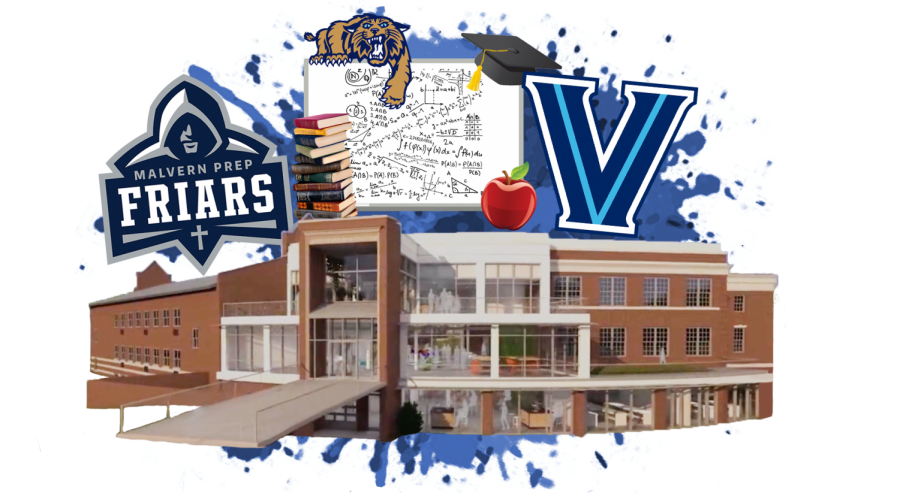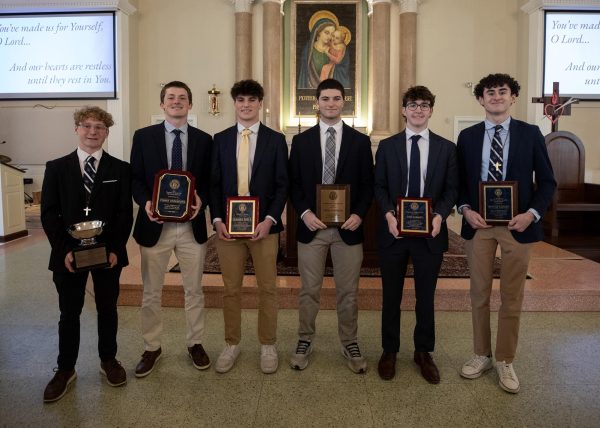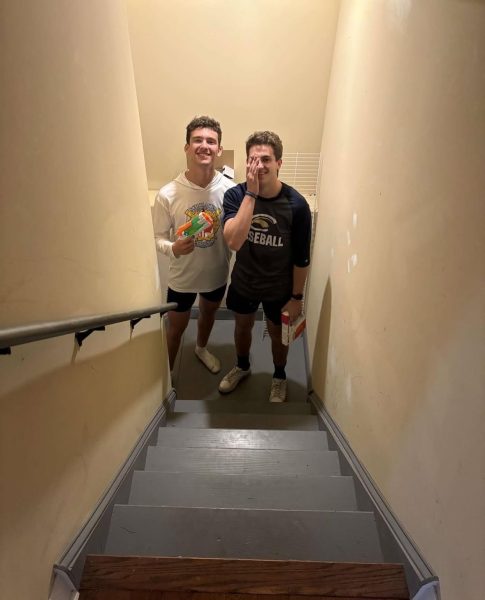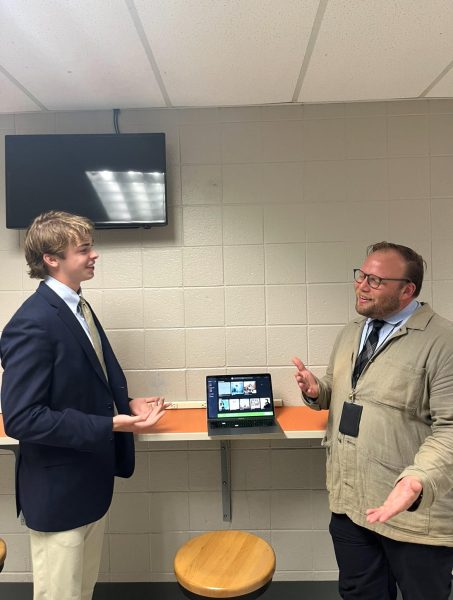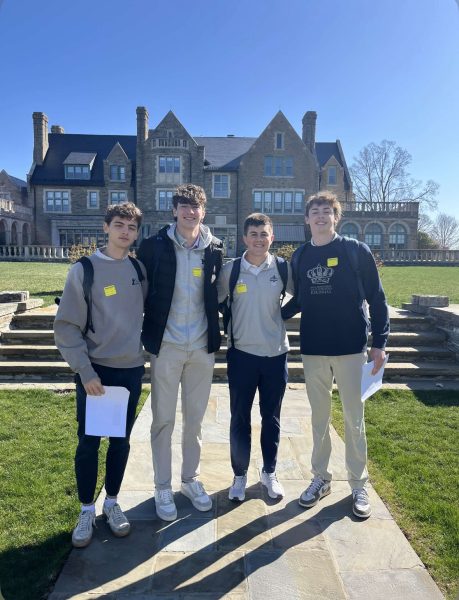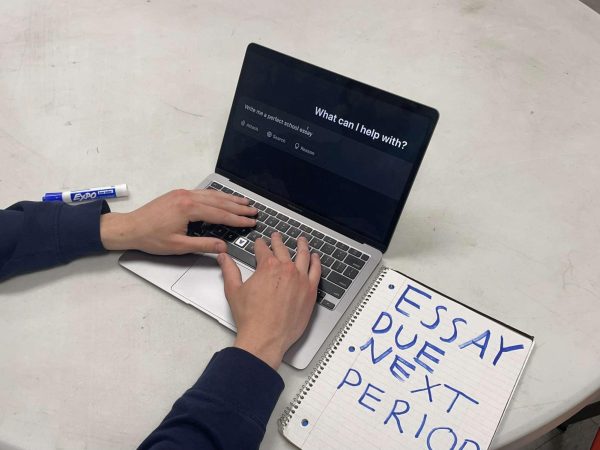A Look Into Malvern’s Student-Teacher Program
Many students have noticed new student-teachers from Villanova observing and teaching classes at Malvern.
Malvern’s Augustinian connection to Villanova University allows for a selection of excellent graduate students to join the student-teacher program. Although Malvern’s small size only allows for a few student-teachers, the program isn’t opposed to expanding.
Across campus, many students have noticed new student-teachers assisting in the classroom. These student-teachers are Master’s students from Villanova University.
Mrs. Beverly Gordon, Dean of Faculty Coaching and Development, says that the partnership with Villanova made sense due to Malvern’s status as an Augustinian school.
“These student-teachers are part of the licensing program for each state, so there are requirements for the number of observation hours as well as classroom hours,” Gordon said. “Villanova University, being an Augustinian school as well, seemed like a natural fit for us because we’re an independent school.”
Gordon says that because Malvern’s teachers have such a high reputation, they only take students from a certain program at Villanova.
“Since we have a high expectation for our teachers, we only take students from what’s called the Master’s Plus Program,” Gordon said. “That means every student-teacher that you see has an undergraduate degree, and so they’re actually working on their master’s degree. That has been really great for us because that means they already have a degree in a discipline.”
Because of their knowledge in their undergraduate fields of study, Gordon believes that the student-teachers would be ready if they needed to substitute.
“Should there be a time when they could have an opportunity to substitute in a class they’re more than qualified to do that,” Gordon said. “We’ve seen that happen this year quite a bit.”
Although Malvern only takes students from Villanova, Gordon isn’t opposed to looking at other universities.
“They all are from Villanova right now, but it doesn’t mean we aren’t open to taking those from other universities,” Gordon said, “but with Villanova’s Augustinian connection, as well as the fact that we actually have a memorandum of understanding with them, which means that we will take their students because we only have so many teachers.”
Malvern’s small number of teachers makes it difficult to expand their search for student-teachers from other schools.
“We can’t take fifteen or twenty student teachers, that’s not logistically possible,” Gordon said, “so we will take Villanova students first because we usually cap it at three to four.”
Gordon says that Malvern tries to select student-teachers from a variety of subject areas, despite only being able to fit three to four.
“We look at and accept student-teachers across all subject areas,” Gordon said. “What we know is that we have had more English and social studies applicants, than we have science and math, which is true nationwide. That’s just the way that it shakes out as far as people going into education. Over the last two years we had three Latin teachers, as well as one Spanish teacher. So we take folks from everywhere, and I would love to see a science and math teacher come through as well.”
In addition to observing and sometimes teaching in the classroom, student-teachers can attend orientation programs that new teachers at Malvern go through.
“I hold monthly new teacher meetings which are for any new teachers as well as our student-teachers,” Gordon said. “They have a very intense orientation program that they go through here that is, in large part, all credit to Mrs. Dougherty. She works on my team, and she is really terrific with that, so we make sure they know things like how the schedule works, all of the things about our school in particular. I also meet with them separately to talk about things like applying for jobs interview processes.”
Gordon believes that classroom experience is critical for new teachers in order to share their knowledge with students.
“I can say fully that the teachers we get are extremely skilled in their discipline, but just like any teacher, it doesn’t matter what age you are if you have not been in a classroom,” Gordon said. “It is so difficult to translate all of that knowledge in your head to breaking it down and making sure other people understand it. You can understand it very well, but that doesn’t mean you can teach it to somebody. So the student-teachers actually do a lot of self-discovery, asking themselves ‘is this something I can really do during that time?’”
Gordon says that the availability of such qualified student-teachers makes them great candidates should Malvern ever need a new teacher.
“I personally have been grateful for it because I do think it allows for a seamlessness of instruction for our children, which is what I’m always seeking,” Gordon said. “There’s a seamless system of instruction that we can provide because of the highly qualified candidates that we’re getting, so I’ve been very happy with the program and very happy working with Villanova.”
Mrs. Susan Giordani, a freshman English teacher, believes that the process student-teachers go through really eases them into teaching.
“The way student-teachers work, they come in and they do observations first, and then you get to know them,” Giordani said. “Then we start talking about stuff like, how do they want to teach whatever the next thing is. We’ll go more in depth hopefully over spring break and talk about exactly what they will be teaching.”
Although her student-teacher, Ms. Lauren Depiero, won’t start teaching her classes until term four, she has already made an impact in the classroom.
“When she was in my classroom observing, she would always go and help out,” Giordani said. “She was great with the kids and we were really getting to know who she was. I’m excited because next term, they’ve experienced her a little bit, and it’ll get much more hands-on where she’ll be leading the class a lot.”
When observing a class, student-teachers must acquire certain skills in order to take their teaching to a higher level.
“I always emphasize listening to students because students have a lot to say,” Giordani said, “and you can learn so much from them.”
Giordani believes it is important for teachers to be able to adapt and change their lesson plan on the fly.
“I really try to emphasize teaching choice,” Giordani said. “Sometimes you come in and get a certain plan in mind, and you realize this just isn’t working with whatever the dynamics are that day, so you have to be able to change on the fly.”
Giordani also thinks it is important for class to be a challenge for her students.
“One thing that I really worked on with student-teachers is that you need to have a certain expectation, and you’ve got kids who are going to want to do it differently,” Giordani said. “They’re going to want to try something else. I always say if it comes down to choice, give students options for what they want to do, because that’s how they’re going to best learn if they pick something that’s interesting to them.”
“I think we’re so lucky to have it,” Giordani said. “I think it’s fun for the kids to see fresh faces, and to see different perspectives and try different things. It’s fun for the teachers to be able to learn new things from each other and be able to work collaboratively. It’s one of the reasons we first started doing it. I jumped immediately to this board and I said that I’m happy to take on as many as you want to give me, because I love working with them.”


